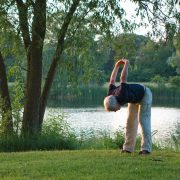Why Stretching Isn’t Solving Your Tight Hips
If your hips always feel tight – whether during workouts, long walks, or just sitting at your desk – it can be incredibly frustrating. Not only is it uncomfortable, but tight hips often contribute to nagging lower back pain. And what’s even more confusing? No matter how much stretching you do, the tightness keeps coming back.
For me – that’s typically a clue that the problem isn’t what you think it is.
Muscles can feel tight for many different reasons – and not all of them have to do with flexibility. While some muscles truly are short and need to be lengthened – others feel tight because they’re overworked, weak, or compensating for something else. In those cases – stretching alone won’t solve the issue – and might even make things worse.
Let’s break this down…
Take your psoas muscle, for example. It’s one of your deep hip flexors and also plays a key role in spinal and pelvic stability. If your core and glutes (also spinal and pelvic stabilizers) aren’t doing their jobs – your psoas will kick in to help. That overcompensation can lead to it feeling chronically tight – even though it’s not technically “shortened”. So while the inclination will be to stretch your psoas – you’re actually putting an unintended strain on an already tired and stressed muscle.
While stretching might give you a temporary break in this instance – it won’t address the real problem. You need to strengthen your deep abdominals, your core stability, and your glutes. When all of these systems kick in collectively, your psoas can finally relax – and your chronic tightness will resolve on its own.
But there’s one more thing most people don’t even think of – and it’s that the tightness in your hip flexors could also be a symptom of a mechanical problem – not a muscular one.
Mechanical pain refers to pain (or tension) that’s caused by poor movement patterns or joint dysfunction, not necessarily tissue damage, compensation, or tightness. If the way your hips, pelvis, or lower back are moving is off – even slightly – your body will compensate. Over time, this leads to overuse of certain muscles – like your psoas, for example – which then feel constantly tight or strained. Unless the underlying movement problem is corrected, you’ll keep chasing symptoms instead of fixing the root cause by constantly stretching.
This concept of tightness due to overworking and compensation can happen to any muscle in your body. With hips in particular, your psoas isn’t the only culprit. Your piriformis and TFL (tensor fascia latae) can become victims of these patterns as well. In addition to your psoas muscle – your piriformis and/or TFL loves to pitch in and compensate for weak gluteal and core muscles as well. An overworked piriformis leads to difficulty sitting cross-legged – and a tight TFL can be painful and lead to IT band problems. You can stretch all you want – but if you don’t address the underlying cause and give these muscles a chance to relax – your hips will constantly feel tight. Plus, stretching in and of itself is a form of load on your muscle. You don’t want to add more load to an already tired and angry muscle.
The moral of the story?
If your hips feel chronically tight – and stretching all the time isn’t making a lasting difference – it’s time to consider a different approach. Most people don’t think to strengthen a muscle that feels tight – but it might be exactly what your body needs. When it comes to your hips, the areas to assess are your deep abdominals and your glutes. Often, there’s an underlying weakness or movement dysfunction you just can’t see on your own. And if your muscle tightness stems from a mechanical issue – like poor joint alignment or faulty movement patterns – no amount of stretching or strengthening will fully work until that’s addressed.
A trained mechanical pain expert can help you identify whether it’s a strength problem, a movement problem, or a combination of both – so you can finally get lasting relief.
Feel free to reach out to our mechanical pain specialists if you’re local and looking for help by clicking here.
Dr. Carrie Jose, Physical Therapy Specialist, and Mechanical Pain Expert, owns CJ Physical Therapy & Pilates in Portsmouth, NH, and writes for Seacoast Media Group. If local to Portsmouth, NH, and looking for help – request a FREE Discovery Visit with one of her Specialists by CLICKING HERE.



